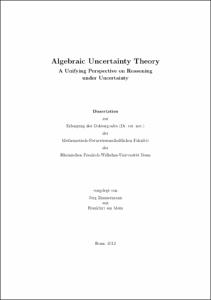Zimmermann, Jörg: Algebraic Uncertainty Theory : A Unifying Perspective on Reasoning under Uncertainty. - Bonn, 2013. - Dissertation, Rheinische Friedrich-Wilhelms-Universität Bonn.
Online-Ausgabe in bonndoc: https://nbn-resolving.org/urn:nbn:de:hbz:5n-32168
Online-Ausgabe in bonndoc: https://nbn-resolving.org/urn:nbn:de:hbz:5n-32168
@phdthesis{handle:20.500.11811/5686,
urn: https://nbn-resolving.org/urn:nbn:de:hbz:5n-32168,
author = {{Jörg Zimmermann}},
title = {Algebraic Uncertainty Theory : A Unifying Perspective on Reasoning under Uncertainty},
school = {Rheinische Friedrich-Wilhelms-Universität Bonn},
year = 2013,
month = may,
note = {The question of how to represent and process uncertainty is of fundamental importance to the scientific process, but also in everyday life. Currently there exist a lot of different calculi for managing uncertainty, each having its own advantages and disadvantages. Especially, almost all are defining the domain and structure of uncertainty values a priori, e.g., one real number, two real numbers, a finite domain, and so on, but maybe uncertainty is best measured by complex numbers, matrices or still another mathematical structure. This thesis investigates the notion of uncertainty from a foundational point of view, provides an ontology and axiomatic core system for uncertainty and derives and not defines the structure of uncertainty. The main result, the ring theorem, stating that uncertainty values are elements of the [0,1]-interval of a partially ordered ring, is used to derive a general decomposition theorem for uncertainty values, splitting them into a numerical interval and an ``interaction term''. In order to illustrate the unifying power of these results, the relationship to Dempster-Shafer theory is discussed and it is shown that all Dempster-Shafer measures over finite domains can be represented by ring-valued uncertainty measures. Finally, the historical development of approaches to modeling uncertainty which have led to the results of this thesis are reviewed.},
url = {https://hdl.handle.net/20.500.11811/5686}
}
urn: https://nbn-resolving.org/urn:nbn:de:hbz:5n-32168,
author = {{Jörg Zimmermann}},
title = {Algebraic Uncertainty Theory : A Unifying Perspective on Reasoning under Uncertainty},
school = {Rheinische Friedrich-Wilhelms-Universität Bonn},
year = 2013,
month = may,
note = {The question of how to represent and process uncertainty is of fundamental importance to the scientific process, but also in everyday life. Currently there exist a lot of different calculi for managing uncertainty, each having its own advantages and disadvantages. Especially, almost all are defining the domain and structure of uncertainty values a priori, e.g., one real number, two real numbers, a finite domain, and so on, but maybe uncertainty is best measured by complex numbers, matrices or still another mathematical structure. This thesis investigates the notion of uncertainty from a foundational point of view, provides an ontology and axiomatic core system for uncertainty and derives and not defines the structure of uncertainty. The main result, the ring theorem, stating that uncertainty values are elements of the [0,1]-interval of a partially ordered ring, is used to derive a general decomposition theorem for uncertainty values, splitting them into a numerical interval and an ``interaction term''. In order to illustrate the unifying power of these results, the relationship to Dempster-Shafer theory is discussed and it is shown that all Dempster-Shafer measures over finite domains can be represented by ring-valued uncertainty measures. Finally, the historical development of approaches to modeling uncertainty which have led to the results of this thesis are reviewed.},
url = {https://hdl.handle.net/20.500.11811/5686}
}






